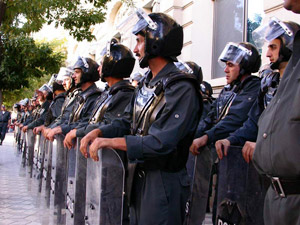On November 7 it was already clear that the checks and balances was very different. The authorities were celebrating their victory and the opposition powers were getting ready for new political actions. In this case the behavior of the opposition in these both countries is very similar. Here the opposition petitions people to complain about the results as it is done there. A lot of people gather. Then they ask them go home, claiming that they would call them later too. The public meeting of November 12 gave a good chance for the authorities that had won the elections to use all power pressure leverages that they had. And then, although fewer people came to the public meeting, the authorities informed them about the correct date of the revolution. But before that ex oppositionist Fazil Ghazafar-Oghli said that the opposition could hardly do anything by organizing public meetings. He said that this was just an attempt to justify themselves because those who didn’t see that the elections were organized in fair and transparent conditions were just blind. And after everything came down, Fazil Ghazafar-Oghli got a position as the president’s advisor.
And during this period oppositionists met with some foreign diplomats, informed them about the electoral violations and told them what kind of solutions could be to stop those shortcomings during the coming five years (but not in the nearest future). An oppositionist said that their views and the views of the diplomats were the same. Others were suspicious about this. Another person named Lala Shefket said that they didn’t recognize the results of the elections because the electoral procedures were out of control. Foreign diplomats relate to these announcements in a very nice and polite manner. I think in this case all they (both the opposition and the authorities) are concentrated at one point: at the White House. Some were expecting to get congratulations, others were waiting for instructions. It was very difficult to find orange ties in the shops of Baku.
Later Washington made a contact both with the opposition and with the authorities (with the help of “American Foreign Affairs Council” deputy head Ilan Berman) and told them that they didn’t like those orange actions any more, because those leaders didn’t keep their promises to be closer to the US, but instead of this they continued to follow Russia. It is also worth to mention that the same person (Ilan Berman) gave an advice to Azei authorities to start the revolution from the top. The price for orange ties is coming down. The authorities that have won the elections now are making steps towards changes that we have already met.
Starting from November 6 Azeri press doesn’t write anything about the Karabakh issue, as if the border of Armenia and Azerbaijan does not exist.

